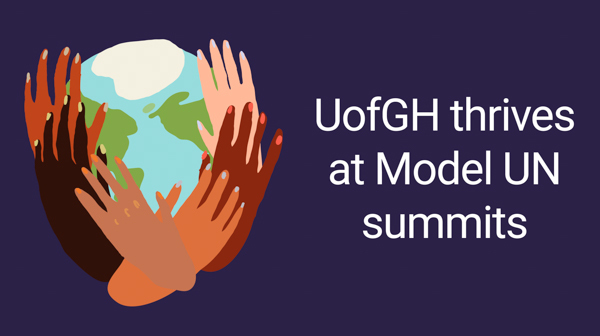
The University of Guelph-Humber’s FCSS Model United Nations delegates were recently honoured for their participation in two different virtual Model UN summits held by Concordia University in Montreal and MacEwan University in Edmonton.
UofGH students were singled out for several awards at the conferences, with Family & Community Social Services student Alyssa Tsontzidis even winning the best delegate award from the UN Women Committee at the Concordia gathering.
The nine-student FCSS University of Guelph-Humber contingent also won two awards for speeches and another for best delegation at the MacEwan conference, where the subject of the event was combating climate change.
“Our collective goal for our first conferences was simply to learn as much as we could and to enjoy the experience. I believe we did so and that is part of the reason we took home wins for every single member on the team,” said Vidita Singh, Co-Director General for UofGH’s FCSS Model UN delegation.
“I think the other part of our success can be attributed to our FCSS team members’ passion for advocating for various world issues and their desire to create meaningful social change. After all, we wouldn’t be in the FCSS program if we didn’t care about the world and how individuals, communities, and politics contribute to or mitigate global social problems.
“I think the University of Guelph-Humber had success because our team was hardworking, passionate about what they were doing and tried their best to just enjoy the simulation.”
The warm reception to the efforts of UofGH’s FCSS Model UN delegation is especially meaningful for the students participating given the disappointment of the program’s inaugural year. In 2020, students spent months preparing for the Concordia conference – and even booked their train tickets and accommodations – only to see the summit cancelled due to the pandemic.
“I was absolutely thrilled by their success, especially after the disappointment of last year's experience,” said Family & Community Social Services Program Head Dr. Paul Sherman, one of two faculty advisors alongside Dr. Nitin Deckha.
“In a way, I think that disappointment gave them extra incentive to participate this year, and so we challenged the students to take part in two virtual MUN conferences, one following the other by only two weeks,” continued Dr. Sherman. “This group of students were highly committed, impassioned, and motivated. Moreover, they had great student leadership, were unified as a team, and extremely well prepared.
“I'm not surprised that they met the success they did at such an early stage in the group's development.”
Meaningful issues
At the Concordia MUN, Tsontzidis represented France on the UN Women committee, discussing two topics over the weekend: gender-based violence and transgender rights.
Tsontzidis participated in moderated and unmoderated caucuses as well as the development of a working paper, along with other typical Model UN procedures. In her award-winning session, she spoke about France’s current and past actions to combat violence and protect trans lives.
“These discussions increased my knowledge of gender issues and what can be done to promote gender equality on a global scale,” Tsontzidis reflected. “Overall, the conference was a great experience to connect with people from around the world, learn about women's rights, and strengthen my connection with my peers at Guelph-Humber.”
Winning the best delegate award, she said, was an honour that reflected the dedication of her entire delegation.
“This award shines a light on women’s rights – an important issue to me,” she said. “Not only did I learn more about trans rights and gender-based violence, but I also advocated for these issues through discussion and the development of a working paper. I am passionate about women’s issues and feel that it is important to advocate for gender equality. Moreover, this award recognized the team’s efforts put into Model UN and the importance of women’s rights.”
Model planning
Just as the summits took place virtually, the FCSS Model UN delegation’s planning was conducted over videoconferencing calls and Google docs. Although competing against much larger institutions was nerve-racking, the team ultimately felt a special bond that made the digital collaboration easier.
“Through our team meetings, coaching, and collaboratively working with one another remotely, we all got to learn together as well as from one another,” said Bhavi Gandhi, FCSS student and the Model UN team’s Co-Director General alongside SIngh.
“I think the fact that GH is such a small-knit community where everyone knows everyone really helped empower a great cohesion and rapport between the team members as well, even when working digitally.”
Singh, Gandhi and the other seven students comprising the FCSS Model UN delegation were inspired to join the FCSS Model UN largely by their passion for social justice and advocacy. To that end, the recent conferences were rewarding not just because of the honours the students received, but because of the urgent issues they explored.
“Model United Nations helped connect students all over for a common cause: to create and inspire change,” Gandhi said. “Not only were we able to form new alliances but we found that we were able to build on our team-building skills, especially when collaborating with people all across the globe. We found that we were able to utilize our knowledge of what it means to be a global citizen and advocate for change and put some of the tools from our FCSS toolkit into action.”







